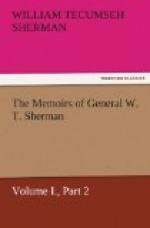Sixth. I do doubt the capacity of Willow Bayou (which I estimate to be fifty miles long and very tortuous) as a military channel, to supply an army large enough to operate against Jackson, Mississippi, or the Black River Bridge; and such a channel will be very vulnerable to a force coming from the west, which we must expect. Yet this canal will be most useful as the way to convey coals and supplies to a fleet that should navigate the lower reach of the Mississippi between Vicksburg and the Red River.
Seventh. The chief reason for operating solely by water was the season of the year and high water in the Tallahatchie and Yalabusha Rivers. The spring is now here, and soon these streams will be no serious obstacle, save in the ambuscades of the forest, and whatever works the enemy may have erected at or near Grenada. North Mississippi is too valuable for us to allow the enemy to hold it and make crops this year.
I make these suggestions, with the request that General Grant will read them and give them, as I know he will, a share of his thoughts. I would prefer that he should not answer this letter, but merely give it as much or as little weight as it deserves. Whatever plan of action he may adopt will receive from me the same zealous cooperation and energetic support as though conceived by myself. I do not believe General Banks will make any serious attack on Port Hudson this spring. I am, etc.,
W. T. Sherman, Major-General.
This is the letter which some critics have styled a “protest.” We never had a council of war at any time during the Vicksburg campaign. We often met casually, regardless of rank or power, and talked and gossiped of things in general, as officers do and should. But my letter speaks for itself—it shows my opinions clearly at that stage of the game, and was meant partially to induce General Grant to call on General McClernand for a similar expression of opinion, but, so far as I know, he did not. He went on quietly to work out his own designs; and he has told me, since the war, that had we possessed in December, 1862, the experience of marching and maintaining armies without a regular base, which we afterward acquired, he would have gone on from Oxford as first contemplated, and would not have turned back because of the destruction of his depot at Holly Springs by Van Dorn. The distance from Oxford to the rear of Vicksburg is little greater than by the circuitous route we afterward followed, from Bruinsburg to Jackson and Vicksburg, during which we had neither depot nor train of supplies. I have never criticised General Grant’s strategy on this or any other occasion, but I thought then that he had lost an opportunity, which cost him and us six months’ extra-hard work, for we might have captured Vicksburg from the direction of Oxford in January, quite as easily as was afterward done in July, 1863.




